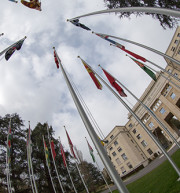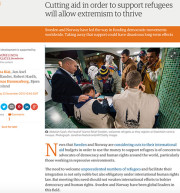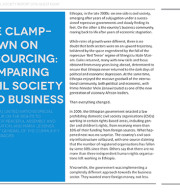
По мере приближения срока завершения моего мандата, я стал размышлять о тех годах, что я провел на этой позиции, а именно о том, насколько изменился мир всего лишь за шесть лет с момента начала моего мандата, созданного Советом по правам человека ООН. Октябрь 2010. Разве мог кто-либо предположить, что принесут нам 2011-2017 годы? В то время права на свободу мирных собраний и объединений терялись в пантеоне общих и наиболее ценимых прав: о них знали, но редко они были главной новостью. В последующие годы, они легли в основу самых поворотных событий 21 века: революции в Тунисе, Египте и в других странах; массовые протесты, которые вынудили руководство таких стран, как Украина, Гватемала, Исландия, Южная Корея, Буркина Фасо и... Continue reading →

As my time as Special Rapporteur nears its end, I have been reflecting a great deal on my six years in the position - and just how much the world has changed since the Human Rights Council created my mandate in October 2010. Could anyone have imagined what the years 2011-17 would bring? Back then, the rights to freedom of peaceful assembly and of association were somewhat neglected in the pantheon of our most cherished rights - known, but rarely in the headlines. In the years since, they have underpinned some of the most cataclysmic political events of the 21st century: revolutions in Tunisia, Egypt and elsewhere; mass protests that forced out leaders in Ukraine, Guatemala, Iceland, South Korea, Burkina Faso and Brazil; citizen movements in Hong Kong, Bahrain, Malaysia, the United States; and so much more. And remarkably, all of this happened while governments everywhere were embarking upon the most comprehensive rollback of civic freedoms since the end of the Cold War: anti-NGO laws, restrictions on protests, increased militarization of police, and campaigns of violence, intimidation, stigmatization and arrests against activists, just to name a few. As Special Rapporteur, I was lucky enough to have a front row seat as these events unfolded - to witness them, to meet with the people who shaped them,... Continue reading →

UN Special Rapporteur Maina Kiai has authored an op-ed in Foreign Policy in which he calls upon international financial institutions to counter the global trend of closing civil society space by promoting more community participation in their activities. His call comes roughly one year since the United Nations set the Sustainable Development Goals (SDDGs), an ambitious blueprint for governments and financiers to use their political power and resources to end poverty, hunger, and disease. Kiai notes in the op-ed that while development banks play a key role in ensuring the success of the SDGs, they cannot do it alone. "Far more important than governments and international donors are the individuals and civic organizations that will help design, carry out, and monitor the development projects on which the whole scheme depends," Kiai wrote in the piece. "Without vibrant civil societies, the Sustainable Development Goals are dead in the water." Despite this, the entire concept of participatory development is in danger, Kiai notes. In many parts of the world, groups and activists who work to improve development proposals "increasingly find themselves threatened, intimidated, and even violently attacked by governments, investors, private security forces, and others who want to avoid scrutiny." "As I... Continue reading →

Commentary by Maina Kiai, UN Special Rapporteur on the rights to freedom of peaceful assembly and of association It’s been well documented in recent years that space for ordinary people to exercise their fundamental freedoms – and to participate in their own governance – is closing at a rapid and disturbing pace worldwide. A 2015 study, for example, showed that the core freedoms of expression, association and peaceful assembly were violated to a significant degree in at least 96 countries during 2014. And that is only one of many indicators. What’s less discussed is that space to exercise fundamental freedoms is closing at the international level as well. And ground zero, shamefully, is the very place where these rights should be thriving: The United Nations, one of whose pillars, ironically, is human rights. The United Nations human rights bodies and mechanisms, including the Human Rights Council, are key spaces for NGOs to exercise their rights to freedom of expression, association and peaceful assembly that are so frequently denied back home. But the same governments that are restricting NGOs domestically are stepping up efforts to take away NGOs’ voices on the international stage as well. They are doing this by hijacking, and subsequently closing, the main door used by civil society... Continue reading →

UN Special Rapporteur Maina Kiai has authored a piece on his mandate's litigation project for the latest edition of Sur, the international journal of human rights journal published by Conectas. The piece appears in Sur issue 22, and gives an overview of the litigation project and the cases it has handled thus far. Launched in 2014, the litigation project focuses on providing technical assistance and advisory services for public interest litigation on assembly and association issues. The aim of the project is to increase such litigation and encourage the application of international law norms at the domestic level. The Special Rapporteur has also submitted three amicus briefs in cases relevant to the rights to freedom of peaceful assembly and of association. "Litigation does present advantages unique among rights-promotion tools," Kiai writes in the Sur piece. "When used in the right context, for example, it can ensure concrete remedies: accountability, compensation and some closure. Litigation can also shine a light on repression by forcing the government to address issues head-on in a public setting, whether through written procedures or open hearings. Independent courts and strong rulings can provide backing for activists, halt abuses and command societal change." The essay provides an in-depth... Continue reading →

There are any number of words that could be used to describe the events of 2015 - inspiring, uplifting, informative, moving, even maddening. But there is one word that cannot be used: satisfying. That is unfortunate, because the year was filled with stirring tales of courage, dedication and passion from activists all over the world: Burundi, the Maldives, Malaysia, Brazil, Bahrain, Venezuela, Russia and more. Some made lonely stands for justice in the face of daunting odds. Others stood shoulder-to-shoulder to demonstrate with tens of thousands of their compatriots. And in a few cases, some of these individuals even spurred rapid, remarkable change – as was the case in Guatemala, where protests played a key role in forcing the President to resign in the face of corruption allegations. The problem is that far too many of these stories had the wrong ending in 2015. One of Burundi’s leading activists, Pierre Claver Mbonimpa, narrowly escaped assassination for standing up for his beliefs; his son and son-in-law were not so lucky. Citizens who took to the street calling for an investigation into a US $700 million corruption case against the Malaysian Prime Minister found some of their numbers arrested; yet no one implicated in the scandal has been charged. In Russia, an opposition activist was... Continue reading →

UN Special Rapporteur Maina Kiai has co-authored a commentary for the Guardian's Global Development blog urging the governments of Sweden and Norway not to cut international development aid to support the recent influx of refugees. The piece was co-authored by former Council of Europe Commissioner for Human Rights Thomas Hammarberg, former Swedish ambassador for human rights Jan Axel Nordlander, Civil Rights Defenders executive director Robert Hardh; and Norwegian Helsinki Committee secretary general Bjørn Engesland. Sweden is currently studying the potential effects of cutting its aid budget by up to 60%, while Norway is reportedly looking at a roll-back of approximately 21%. The authors note that both countries are among the most generous in the world in terms of foreign aid - particularly when it comes to giving directly to civil society. Sweden, for example, dedicates roughly one-sixth of its aid budget to civil society, including support for those working on democracy-building and human rights. Reducing this support would decimate civil society at a time when such support is most needed. "The consequences of a weakened global civil society movement could ultimately come back to haunt Sweden and Norway," the authors write. "Funding independent civil society in other countries is not just... Continue reading →

UN Special Rapporteur Maina Kiai has co-authored an essay with Community of Democracies Secretary General Maria Leissner comparing the ability of business and civil society to access resources worldwide. The piece appears in CIVICUS's 2015 "State of Civil Society Report," and previews one of the issues that the Special Rapporteur will explore in his upcoming report to the UN General Assembly in October 2015. "At first glance, the business and civil society sectors may seem strange bedfellows for comparison. Conventional wisdom tells us that these two entities are distinct, warranting separate rules and treatment," Kiai and Leissner write. "But beyond their dissimilar profit motives, just how different are businesses and civil society? And how differently should governments treat them?" The essay cites a number of examples where several governments go to much greater lengths to create a conducive environment for business investment, while virtually shutting off similar funding for civil society. Ethiopia, for example, has actively encouraged foreign investment in its business sector over the past seven years, leading to an economic boom. The country is now creating millionaires faster than any country on earth, while gross domestic product growth has averaged 39% a year, according to one source.... Continue reading →

UN Special Rapporteur Maina Kiai has authored a commentary for Article 19’s Join the Debate blog, arguing that multilateral institutions need to democratize themselves – particularly by respecting the rights to freedom of peaceful assembly and of association – in order to remain relevant in the 21st century. Kiai tackles the issue of multilateral institutions and their effect on the rights to freedom of peaceful assembly and of association in his latest thematic report, which will be presented to the UN General Assembly on Oct. 28. “I am convinced that the traditional approach to multilateralism is doomed to fail in the 21st century, an era where people are more connected, more informed, and more aware of the impact that multilaterals can have upon their lives,” Kiai wrote in the piece for Article 19. “Multilaterals institute development projects, spur economic and political reform, help shape international law, and more. Ordinary people need a channel to influence these critical decisions, or their anger and frustration will boil over.” Kiai cites several areas where “multilateral institutions are not doing enough to ensure that people outside the state power structure have their say,” including access to information policies, complaints mechanisms and civil society engagement... Continue reading →

Maina Kiai has called on the incoming UN High Commissioner for Human Rights, Prince Zeid, to “hold governments accountable for the human rights pledges that they make” and ensure that human rights is a “real rather than rhetorical” pillar of the UN system. The call came in a commentary by Kiai that was published today in openGlobalRights, a multilingual online publication that covers human rights issues worldwide. The publication is currently running a series of pieces in which global leaders give their advice for the incoming High Commissioner, who takes up his post in September. The catalyst for Kiai’s piece was a recent joint statement by the UN System in Kenya (UN-Kenya) and the Kenya Private Sector Alliance in which they expressed concern about an important political rally planned by the opposition party in Kenya. The rally took place on July 7 and concluded peacefully. But according to the statement, UN-Kenya and its business partners were “convinced” in advance that the rally would “… create more tensions anxiety among investors and Kenyans in general.” The only solution to Kenya’s problems, they said, is “… a peaceful, secure environment in which investors are confident that their investments are secure. “Why should UN-Kenya reflexively align itself with... Continue reading →